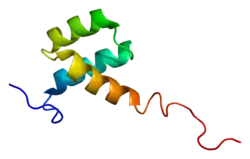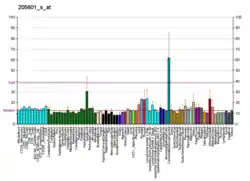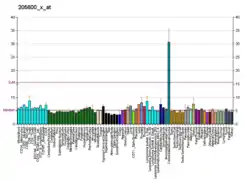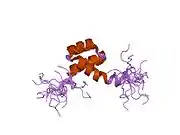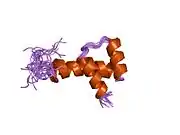HOXB5
Homeobox protein Hox-B5 is a protein that in humans is encoded by the HOXB5 gene.[5][6][7]
Function
This gene is a member of the Antp homeobox family and encodes a nuclear protein with a homeobox DNA-binding domain. It is included in a cluster of homeobox B genes located on chromosome 17. The encoded protein functions as a sequence-specific transcription factor that is involved in lung and gut development. Increased expression of this gene is associated with a distinct biologic subset of acute myeloid leukemia (AML) and the occurrence of bronchopulmonary sequestration (BPS) and congenital cystic adenomatoid malformation (CCAM) tissue.[7]
See also
References
- GRCh38: Ensembl release 89: ENSG00000120075 - Ensembl, May 2017
- GRCm38: Ensembl release 89: ENSMUSG00000038700 - Ensembl, May 2017
- "Human PubMed Reference:". National Center for Biotechnology Information, U.S. National Library of Medicine.
- "Mouse PubMed Reference:". National Center for Biotechnology Information, U.S. National Library of Medicine.
- McAlpine PJ, Shows TB (Jul 1990). "Nomenclature for human homeobox genes". Genomics. 7 (3): 460. doi:10.1016/0888-7543(90)90186-X. PMID 1973146.
- Scott MP (Nov 1992). "Vertebrate homeobox gene nomenclature". Cell. 71 (4): 551–3. doi:10.1016/0092-8674(92)90588-4. PMID 1358459. S2CID 13370372.
- "Entrez Gene: HOXB5 homeobox B5".
Further reading
- Galang CK, Hauser CA (May 1992). "Cooperative DNA binding of the highly conserved human Hox 2.1 homeodomain gene product". The New Biologist. 4 (5): 558–68. PMID 1355360.
- Peverali FA, D'Esposito M, Acampora D, Bunone G, Negri M, Faiella A, Stornaiuolo A, Pannese M, Migliaccio E, Simeone A (Oct 1990). "Expression of HOX homeogenes in human neuroblastoma cell culture lines". Differentiation; Research in Biological Diversity. 45 (1): 61–9. doi:10.1111/j.1432-0436.1990.tb00458.x. PMID 1981366.
- Giampaolo A, Acampora D, Zappavigna V, Pannese M, D'Esposito M, Carè A, Faiella A, Stornaiuolo A, Russo G, Simeone A (Jun 1989). "Differential expression of human HOX-2 genes along the anterior-posterior axis in embryonic central nervous system". Differentiation; Research in Biological Diversity. 40 (3): 191–7. doi:10.1111/j.1432-0436.1989.tb00598.x. PMID 2570724.
- Acampora D, D'Esposito M, Faiella A, Pannese M, Migliaccio E, Morelli F, Stornaiuolo A, Nigro V, Simeone A, Boncinelli E (Dec 1989). "The human HOX gene family". Nucleic Acids Research. 17 (24): 10385–402. doi:10.1093/nar/17.24.10385. PMC 335308. PMID 2574852.
- Boncinelli E, Acampora D, Pannese M, D'Esposito M, Somma R, Gaudino G, Stornaiuolo A, Cafiero M, Faiella A, Simeone A (1990). "Organization of human class I homeobox genes". Genome. 31 (2): 745–56. doi:10.1139/g89-133. PMID 2576652.
- Rabin M, Ferguson-Smith A, Hart CP, Ruddle FH (Dec 1986). "Cognate homeo-box loci mapped on homologous human and mouse chromosomes". Proceedings of the National Academy of Sciences of the United States of America. 83 (23): 9104–8. Bibcode:1986PNAS...83.9104R. doi:10.1073/pnas.83.23.9104. PMC 387083. PMID 2878432.
- Hart CP, Awgulewitsch A, Fainsod A, McGinnis W, Ruddle FH (Nov 1985). "Homeo box gene complex on mouse chromosome 11: molecular cloning, expression in embryogenesis, and homology to a human homeo box locus". Cell. 43 (1): 9–18. doi:10.1016/0092-8674(85)90007-8. PMID 3000607. S2CID 44802225.
- Xu WM, Gorman PA, Rider SH, Hedge PJ, Moore G, Prichard C, Sheer D, Solomon E (Nov 1988). "Construction of a genetic map of human chromosome 17 by use of chromosome-mediated gene transfer". Proceedings of the National Academy of Sciences of the United States of America. 85 (22): 8563–7. Bibcode:1988PNAS...85.8563X. doi:10.1073/pnas.85.22.8563. PMC 282499. PMID 3186746.
- Simeone A, Mavilio F, Bottero L, Giampaolo A, Russo G, Faiella A, Boncinelli E, Peschle C (1986). "A human homoeo box gene specifically expressed in spinal cord during embryonic development". Nature. 320 (6064): 763–5. Bibcode:1986Natur.320..763S. doi:10.1038/320763a0. PMID 3453105. S2CID 4322447.
- Hauser CA, Joyner AL, Klein RD, Learned TK, Martin GR, Tjian R (Nov 1985). "Expression of homologous homeo-box-containing genes in differentiated human teratocarcinoma cells and mouse embryos". Cell. 43 (1): 19–28. doi:10.1016/0092-8674(85)90008-X. PMID 4075393. S2CID 46477046.
- Levine M, Rubin GM, Tjian R (Oct 1984). "Human DNA sequences homologous to a protein coding region conserved between homeotic genes of Drosophila". Cell. 38 (3): 667–73. doi:10.1016/0092-8674(84)90261-7. PMID 6091895. S2CID 28848659.
- Galang CK, Hauser CA (Aug 1993). "Cooperative DNA binding of the human HoxB5 (Hox-2.1) protein is under redox regulation in vitro". Molecular and Cellular Biology. 13 (8): 4609–17. doi:10.1128/mcb.13.8.4609. PMC 360087. PMID 8101633.
- Apiou F, Flagiello D, Cillo C, Malfoy B, Poupon MF, Dutrillaux B (1996). "Fine mapping of human HOX gene clusters". Cytogenetics and Cell Genetics. 73 (1–2): 114–5. doi:10.1159/000134320. PMID 8646877.
- Kuliev A, Kukharenko V, Morozov G, Freidine M, Rechitsky S, Verlinsky O, Ivakhnenko V, Gindilis V, Strom C, Verlinsky Y (Feb 1996). "Expression of homebox-containing genes in human preimplantation development and in embryos with chromosomal aneuploidies". Journal of Assisted Reproduction and Genetics. 13 (2): 177–81. doi:10.1007/BF02072541. PMID 8688592. S2CID 28126784.
- Sakach M, Safaei R (Aug 1996). "Localization of the HoxB5 protein in the developing CNS of late gestational mouse embryos". International Journal of Developmental Neuroscience. 14 (5): 567–73. doi:10.1016/0736-5748(96)00052-4. PMID 8930688. S2CID 137937.
- Archavachotikul K, Ciccone TJ, Chinoy MR, Nielsen HC, Volpe MV (Mar 2002). "Thyroid hormone affects embryonic mouse lung branching morphogenesis and cellular differentiation". American Journal of Physiology. Lung Cellular and Molecular Physiology. 282 (3): L359-69. doi:10.1152/ajplung.00400.2000. PMID 11839528.
- Kosaki K, Kosaki R, Suzuki T, Yoshihashi H, Takahashi T, Sasaki K, Tomita M, McGinnis W, Matsuo N (Feb 2002). "Complete mutation analysis panel of the 39 human HOX genes". Teratology. 65 (2): 50–62. doi:10.1002/tera.10009. PMID 11857506.
External links
- HOXB5+protein,+human at the US National Library of Medicine Medical Subject Headings (MeSH)
- Overview of all the structural information available in the PDB for UniProt: P02833 (Drosophila melanogaster Homeotic protein antennapedia) at the PDBe-KB.
This article incorporates text from the United States National Library of Medicine, which is in the public domain.
